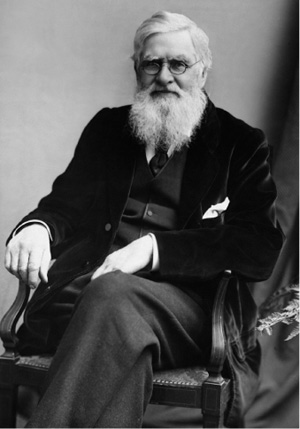Heredity, Natural Selection, and EvolutionNatural Selection |
How did Thomas Malthus influence Charles Darwin? |
Both Charles Darwin and Alfred Russel Wallace read the work of British cleric and scholar Thomas Malthus (1766–1834), who in 1798 had published Essay on the Principle of Population. In that book, Malthus argued that the reproductive rate of humans grows geometrically, far out-pacing the available resources. This means that individuals must compete for a share of the resources in order to survive in what has become known as the “struggle for existence.” Darwin and Wallace incorporated this idea as part of natural selection—that is, adaptations that made for a more successful competitor would be passed on to subsequent generations, leading to greater and greater efficiency.

Never heard of Alfred Russel Wallace? He was the English naturalist who independently came to the same conclusions as Darwin did about natural selection.
